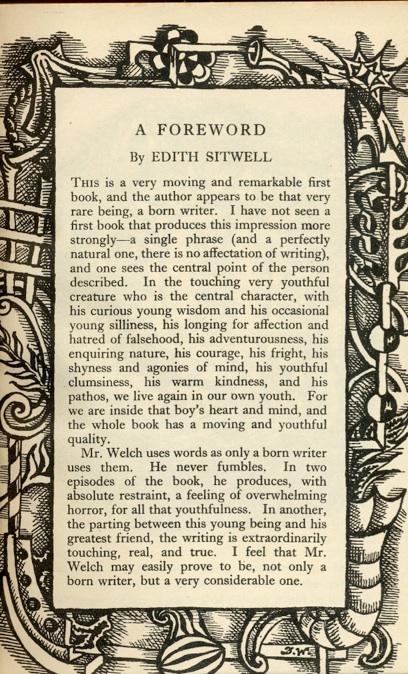 I resolved to read Denton Welch this year, enthused by Des’s advocacy, though the timing was determined by catching sight of a rather distinctive edition of Maiden Voyage, his first novel, in one of the Cecil Court bookshops: an American first with dust wrappers and end papers drawn by Welch.
I resolved to read Denton Welch this year, enthused by Des’s advocacy, though the timing was determined by catching sight of a rather distinctive edition of Maiden Voyage, his first novel, in one of the Cecil Court bookshops: an American first with dust wrappers and end papers drawn by Welch.
With measured and precise description, Welch applies a loupe to people and objects. Although my copy is an American edition, I wonder whether an American reader would get the same pleasure from Welch’s empathetic observation of the nuances of that colossal curse of the English, its class system. Welch’s way of noticing the small things of life ends up creating a fictional (lightly autobiographical) world of epic proportion, one that is singularly alluring.
An extraordinary tension is set up in Maiden Voyage. As Michael Schmidt writes in his study, The Novel: “Welch’s prose is full of paradoxes, his stories of themes that are more telling for being undeclared.” The novel’s narrator often appears reserved, almost priggish, though there is a homoeroticism that almost but never quite breaks surface. It is similar to the sexual tension that suffuses Patricia Highsmith’s writing.
Maiden Voyage tells the story of a boy brought up in east Asia, after his mother’s death he is sent off to an absurd English public school, which he loathes, and from which he briefly absconds. As this storyline so exactly matches my own, I’m the ideal reader for Welch’s story. But beyond that, I am utterly compelled by his attention for small things. Elemental truths lie behind the sights, smells and sounds of apparently banal objects. Writers like Woolf, Proust and Welch sharpen our sights for things that would otherwise remain invisible to us.

Did I see you mention in another piece on this that the novel is a bit contrived? That slightly concerned me, but seems not to have ultimately been a problem for you. Is it a plot thing or what was the issue?
I ask as Denton Welch is very much on my radar, and frankly few of us seem to have read him.
Max, I used the word ‘contrived’ to attempt to capture a quality of Woolf’s The Voyage Out. I’m not sure it was the right word, ‘stiff’ may have been better. It is still quite brilliant.
Maiden Voyage is not remotely contrived. I’ve just picked up Welch’s second novel and two copies of his journals.
Ah, thanks. That’s what I get for reading when tired, I got the two confused.